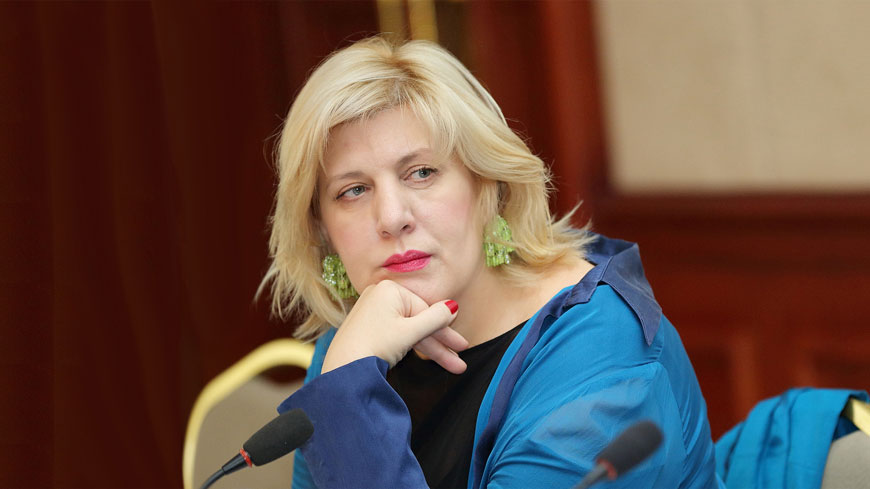EUObserver, 18/11/2021
Warmongering has seriously intensified in Bosnia and Herzegovina.
As some politicians, including in the neighbouring countries Serbia and Croatia, ratchet-up their inflammatory rhetoric, the international community struggles to find a response to escalating tensions.
This situation is dangerous for the people living there and for Europe. The re-emergence of such discourse should trigger an alarm, and remind us of the brutality and serious violations of human rights that people indoctrinated by hateful propaganda can inflict on their fellow human beings.
For those who lived through the atrocities of the Yugoslav wars in the 1990s, this picture is clear and all too familiar.
I am one of them. Born in Sarajevo, I witnessed the subtle ways in which people were indoctrinated by nationalist discourse. The wars of the 1990s were a direct consequence of public discourse which introduced a narrative of 'Us vs Them', and led to the de-humanisation of 'the Other' and the marginalisation of anti-war voices.
Sadly, it seems that we have not learned from the past. As politicians follow the same playbook that led to war three decades ago, their irresponsible rhetoric has become even harsher today, mixing insults, ethnicity, and religious feelings in an explosive atmosphere.
Words matter. They are the connective tissue of collective life, and a failure to understand the degree to which human beings in particular situations can be inflamed by words can have a crippling effect on real-life events and lead to dangerous situations.
Today, people in Bosnia and Herzegovina live in fear of conflict once again.
Council of Europe member states should not underestimate the dangers of this situation.
Now is the time to demonstrate unity in order to protect and promote human rights, democracy, and the rule of law in Bosnia and Herzegovina. Now is the time to work on de-escalation of the tensions by making better use of the multilateral dialogue, co-operation and coordination tools that international organisations provide.
Four urgent steps
As a start, four core principles should be urgently secured.
First, the constitution of Bosnia and Herzegovina and electoral law must be stripped of their discriminatory nature and become inclusive. Twelve years ago, the European Court of Human Rights found in the Sejdić and Finci judgment that the country's constitution and electoral system based on ethnicity were discriminatory.
Implementing that judgment and the others (Zornić, Šlaku and Pilav) dealing with these matters requires the elimination of any discrimination regarding the right to free elections. It is essential to change a constitutional system that has for too long capitalised on lingering ethnic divisions and a discriminatory status quo.
Second, hate speech, genocide denial and the glorification of war criminals must stop. Instead of warmongering and spreading divisive propaganda, politicians in BiH and the region should work towards improving inter-ethnic relations and ensuring that everyone's rights are equally protected.
Civil society and their courageous actions to point out problems should be protected and not suppressed. Efforts to deal with past gross human rights violations should continue, including the search for missing persons, truth-seeking, accountability and building an education system and curriculum that encourages understanding and reconciliation.
Bosnia and Herzegovina cannot do this alone. Neighbouring countries both individually and as part of international organisations should support initiatives working towards these goals and avoid any conduct that may jeopardise their realisation.
Third, improving quality of life and bridging inequalities, which have worsened during the COVID-19 pandemic, should be addressed as a matter of urgency. In that respect, more efforts should be put into institutional and economic reforms, including enabling the independent and effective work of judicial bodies, as well as fighting corruption and its harmful effects on the enjoyment of human rights.
Lastly, the media should play a positive role by reporting ethically and avoiding becoming a tool of well-orchestrated war machinery, as has happened in the past. A free press is a pillar of democracy, to ensure accountability, to expose human rights violations, and prevent incitement to hatred and violence.
While governments have the obligation to ensure the safety and independence of journalists, media actors must act professionally, serving the greater public good instead of divisive political interests.
Tensions mounting in Bosnia and Herzegovina are a real threat for the country, the region and the continent's stability. Defusing them and ensuring human rights protection must become a top priority.



